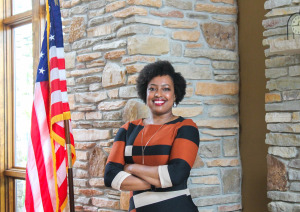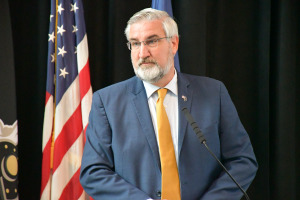
Indiana Gov.-elect Braun appoints public safety secretary
Jennifer-Ruth Green, a combat veteran and deputy commander of the 11th Operations Group at Joint Base Anacostia-Bolling, brings military and cybersecurity experience to the role.

Jennifer-Ruth Green, a combat veteran and deputy commander of the 11th Operations Group at Joint Base Anacostia-Bolling, brings military and cybersecurity experience to the role.

The contracts for IT work are not visible in the state’s transparency portal, where agreements entered into by state agencies are typically housed and made public.

Lawmakers are holding their collective breath in anticipation of Dec. 17 forecasts for tax receipts and Medicaid needs that will determine how they’ll proceed with writing the state’s next two-year budget and funding priorities like education.

The governor-elect’s plans include creating a consolidated workforce development strategy and adding a new entrepreneurship office.

David Adams, a former state workforce development commissioner, will be Indiana’s next secretary of commerce in Indiana Gov.-elect Mike Braun’s administration, while current Secretary of Education Katie Jenner will continue to lead the state’s education system.

Former Pentagon official Lisa Hershman will serve as secretary of management and budget and former state lawmaker Matthew Ubelhor will be secretary of transportation and infrastructure.

Indiana Gov.-elect Mike Braun’s “Freedom and Opportunity Agenda” also addresses his goals for economic development, public health and quality of life factors like public safety, energy affordability and water cleanliness.

The coalition is a state branch of the national nonprofit Right to Start, which advocates for laws that provide tax breaks, provide procurement dollars and reduce regulations for startups and small businesses.

Raising base salaries for teachers was a key focus of Gov.-elect Mike Braun’s platform during the governor’s race, but anxiety about the state budget might be a roadblock.

Democrats assailed the recommendations as not providing enough relief to Hoosier taxpayers, and for giving “handouts” to businesses.

Braun’s new cabinet will seek to model “efficiency, accountability and communication in state government,” he said in a news release.

The letter accuses the Indiana Democratic party of hiding allegations and sheltering offenders. It also demands transparent investigations into any and all allegations of sexual harassment and assault involving party members.

A balanced budget and property-tax relief are among the priorities for state legislators in the Indiana General Assembly.

An expected tight budget cycle could limit how much lawmakers are willing to designate for existing technical investments—never mind additional requests.

Ahead of Organization Day at the Indiana Statehouse on Tuesday, Senate President Pro Tem Rod Bray released his slate of Republican committee chairs.

During the Indiana Chamber Legislative Preview event, Statehouse leaders said the biggest issue on the table—and a major campaign talking point—is property taxes.

Sen. Greg Taylor of Indianapolis was reelected by the Indiana Senate Democratic caucus just hours after The Indianapolis Star reported three women have accused Taylor of sexual harassment.

Rosenberg, whose position includes serving as president and CEO of the Indiana Economic Development Corp., sought permission to take a vaguely defined executive role at Indiana University related to workforce and the economy.

It will be Holcomb’s 27th and final international economic development trip as governor, and his first visits to Kuwait and Saudi Arabia.

A panel of judges ruled 2-1 that the law’s restrictions are within the purview of the Indiana General Assembly and do not infringe on the constitutional rights of transgender children, their parents or medical providers.